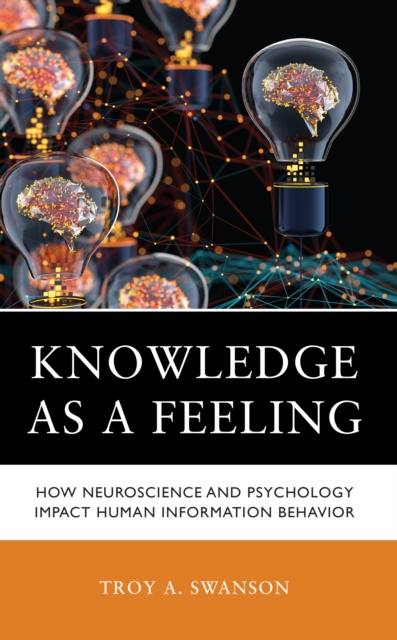
Knowledge as a Feeling : How Neuroscience and Psychology Impact Human Information Behavior Hardback
by Troy A. Swanson
Hardback
Description
Much of information science theory assumes a type of rationality in how individuals process the world around them but the impact of misinformation and disinformation along with the polarization of society into competing information factions calls for new understandings around our relationships to information.
Advances in neuroscience and psychology shed new light on how the brain processes information using both conscious and unconscious systems.
Current theory in neuroscience emphasizes that the mind is not a unified whole but a network of networks constructing reality to anticipate needs.
Knowledge is not a rational process but centers around the feeling of knowing which is the net output of competing brain processes.
The feeling of knowing assumes a group context and offers a social epistemological stance that judges knowledge within this group context.
With knowledge built into groups, power dynamics allow work to be accomplished but also privilege some group members over others.
The feeling of knowing has significant implications for information science challenging theoreticians and practitioners to reconsider how individuals process information.
For information behavior, the feeling of knowing offers a fuller picture looking at conscious and unconscious processing in the production of knowledge.
For information literacy, the feeling of knowing sheds light on how individuals evaluate information and synthesize new sources into their existing knowledge.
Ultimately, the feeling of knowing leads us toward new reflective and metacognitive tools that help meet this moment in the evolution of our information ecosystem.
Information
-
Only a few left - usually despatched within 24 hours
- Format:Hardback
- Pages:326 pages
- Publisher:Rowman & Littlefield
- Publication Date:26/05/2023
- Category:
- ISBN:9781538178928
£85.00
£81.45
Information
-
Only a few left - usually despatched within 24 hours
- Format:Hardback
- Pages:326 pages
- Publisher:Rowman & Littlefield
- Publication Date:26/05/2023
- Category:
- ISBN:9781538178928






